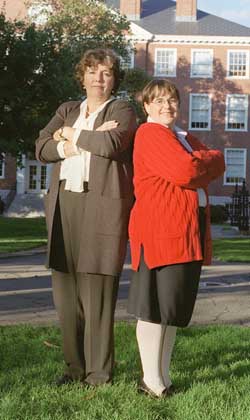Homework wars provoke debate: Experts face off over importance of after-school assignments

The gauntlet hit the floor with a bang during last week’s Askwith Education Forum on “The Homework Wars” sponsored by the Graduate School of Education (GSE) and moderated by Emily Rooney, host of “Greater Boston” on WGBH Television.
Calling it the great “black hole of learning,” educational researcher Etta Kralovec presented her case for reducing, if not abolishing homework in the nation’s public schools. “Homework simply doesn’t make sense in this brave new constructivist world of teaching and learning,” Kralovec stated.
“When work goes home, teachers have little control over who does the work,” she continued. “Teachers [are] unable to scaffold new knowledge for students, and [are] unaware of each student’s true educational progress.
“American kids are crying out to us for some kind of intervention, and I think you only need to look at the tragedy at Columbine [in which 14 students and one teacher were killed at a Colorado high school last year] to say American kids are not very happy right now.”
The controversial theory outlined by Kralovec and political economist John Buell, who co-authored the book “The End of Homework: How Homework Disrupts Families, Overburdens Children, and Limits Learning” (Beacon Press, 2000), raised more than a few eyebrows among fellow panelists and about 100 audience members at Longfellow Hall.
Assistant Professor of Education Janine Bempechat, author of “Getting Our Kids Back on Track: Educating Kids for the Future” (Jossey-Bass, 2000), cogently presented the opposing perspective, arguing that the benefits of homework far outweigh the drawbacks.
“We have no one to blame but ourselves when we find that the national discourse on homework has embraced extreme positions,” Bempechat said. “We come to this in part because we have adopted a very narrow and shortsighted view of the benefits of homework.
“The assignment of homework, over time, serves to foster the kinds of qualities that are critical to learning — persistence, diligence, and the ability to delay gratification,” she continued. “These [skills] become increasingly necessary as students graduate to higher levels of scholarship in middle school, high school, and beyond.”
Kim Marshall, AB ’69, EdM ’81, the principal of Mather School in Boston, added a practical “real life” perspective to the discussion, telling panelists that although it makes “little difference academically” for elementary school children, “homework is a reality” for almost all students and can be an asset if assigned properly. “Homework should be useful, aligned with the curriculum, and kids should be able to do it alone,” he said.
Marshall told the audience he believes homework teaches students responsibility and “sends a powerful message to parents that the school means business.”
Those arguments drew a passionate response from Kralovec, who began researching the topic when she conducted a two-year study of high school dropouts for the Maine Department of Education in the early 1990s, concluding that homework was a major reason why many students left school.
“The most troubling aspect of our work has been confronting the scanty, inconclusive evidence that homework claims are based on,” she said.
“Homework research is plagued by what I like to call the ‘fishing expedition problem’ — if researchers go looking for links between homework and academic achievement, they are likely to find something.”
Kralovec questioned the existence of credible empirical evidence proving that homework improves academic performance. She also quoted statistics indicating that only 15 percent of American school children are happy in the classroom and “everyone else suffers a little bit.”
Bempechat accused Kralovec of pandering to those contemporary theorists who advocate shielding younger children from stress and failure. “There is a growing view that if students have a high self-esteem they will do well in school, when in fact the opposite is true,” she claimed. “[New studies indicate that] students need to struggle in order to develop qualities that all teachers like to see in the classroom.
“The reality is we are living through a period of massive underachievement in our nation’s schools,” Bempechat stated. “We cannot simultaneously bewail the dismal performance of American students on every successive international comparison of academic achievement and then complain that we give our children too much homework!”
Kravolec’s co-author Buell suggested that homework increases the “achievement gap” between children of different socioeconomic backgrounds. “Schools can expand the quality of economic opportunities, but they can also entrench privilege,” he explained. Buell expressed doubts that students perform better simply because schools are demanding more from them.
“Both students and parents are more likely to engage in fulfilling work and enjoy a high quality of life when each also knows that schools and workplaces do not and cannot demand work without end,” he said.
Last week’s lively discussion was the first in a series of Askwith Education Forums scheduled this fall. More information is available on the Web at http://hugse7.harvard.edu/gsedata/calendar_pkg.forums. The discussions are free and open to the public.




